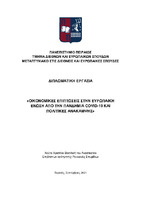| dc.contributor.advisor | Ρουκανάς, Σπυρίδων | |
| dc.contributor.author | Χούτα, Χριστίνα - Βασιλική | |
| dc.date.accessioned | 2022-01-11T09:32:49Z | |
| dc.date.available | 2022-01-11T09:32:49Z | |
| dc.date.issued | 2021-09 | |
| dc.identifier.uri | https://dione.lib.unipi.gr/xmlui/handle/unipi/14023 | |
| dc.identifier.uri | http://dx.doi.org/10.26267/unipi_dione/1446 | |
| dc.description.abstract | Με την ανακήρυξη της COVID-19 σε πανδημία την 11η Μαρτίου 2020 από τον
ΠΟΕ η Ευρώπη κλήθηκε να αντιμετωπίσει τη δεύτερη οικονομική κρίση σε σύντομο
χρονικό διάστημα μετά τη χρηματοπιστωτική κρίση του 2008, καθώς επίσης και τη
μεγαλύτερη κρίση προερχόμενη από μολυσματική ασθένεια μετά την Ισπανική Γρίπη
(1918-1920). Η Ευρωπαϊκή Ένωση συσπειρώθηκε με ταχείς ρυθμούς προκειμένου
να αντιμετωπίσει αυτήν την πολυεπίπεδη απειλή θέτοντας σε εφαρμογή
προϋπάρχοντα όργανα και μέτρα ή θεσπίζοντας άλλα αποκλειστικά για την
ανάκαμψη από την πανδημία. Σκοπός της παρούσας εργασίας είναι η μελέτη των
οικονομικών συνεπειών της πανδημίας της COVID-19 στα κράτη μέλη της ΕΕ, των
τομέων εκείνων που φάνηκαν πιο τρωτοί απέναντι στην πανδημία και τους λόγους
πίσω από αυτήν την αδυναμία, καθώς και των μέτρων που τέθηκαν σε εφαρμογή για
την επιτυχή αναχαίτισή της. Τέλος, γίνονται προτάσεις αναφορικά με τη δομική
αναμόρφωση της ΕΕ προκειμένου να «οικοδομηθεί» μια πιο ανθεκτική ΕΕ και να
αποφευχθούν ή να προληφθούν αντίστοιχα φαινόμενα στο μέλλον.
Η μεθοδολογία που ακολουθείται στο σύνολο της διπλωματικής εργασίας
είναι μια μικτή μέθοδος δευτερογενούς ανάλυσης μέσω βιβλιογραφικής
ανασκόπησης, επαναχρησιμοποίησης δεδομένων, μετά-ανάλυσης και ανάλυσης
τεκμηρίων με σκοπό τη μελέτη των οικονομικών συνεπειών της πανδημίας της
COVID-19 στην ΕΕ. Πιο συγκεκριμένα, προκειμένου να εξεταστεί σε βάθος το ζήτημα
αντλούνται πληροφορίες και υλικό τόσο από πρωτογενείς πηγές (επίσημες σελίδες
οργάνων της ΕΕ, μελέτες, έρευνες), αλλά και δευτερογενείς πηγές όπως τα ευρήματα
πρωτογενών ερευνών.
Τα βασικά συμπεράσματα της εργασίας είναι τα εξής: 1) παρόλο που η
COVID-19 δεν είναι η πρώτη πανδημία ή φυσική/οικονομική καταστροφή με την
οποία ήρθε αντιμέτωπη η Ευρώπη, ήταν η πρώτη που κλήθηκε να αντιμετωπίσει στο
πλαίσιο της πολιτικής ενοποίησης και της ενιαίας αγοράς και λειτούργησε ως
δοκιμασία των θεσμών, 2) Η πανδημία έφερε στο φως ή επιδείνωσαν
προϋπάρχουσες οικονομικές και πολιτικές διακρίσεις, καθώς οι τομείς και οι ομάδες
που επλήγησαν αντιμετώπιζαν ήδη δυσκολίες και 3) Παρόλο που η ΕΕ αντιμετώπισε
άμεσα και αποτελεσματικά τις οικονομικές συνέπειες της πανδημίας χρειάζεται να
παρθούν μέτρα πολιτικής και κοινωνικής αναδιάρθρωσης για την αντιμετώπιση
κοινών απειλών στο μέλλον. | el |
| dc.format.extent | 78 | el |
| dc.language.iso | el | el |
| dc.publisher | Πανεπιστήμιο Πειραιώς | el |
| dc.rights | Αναφορά Δημιουργού-Μη Εμπορική Χρήση-Όχι Παράγωγα Έργα 3.0 Ελλάδα | * |
| dc.rights.uri | http://creativecommons.org/licenses/by-nc-nd/3.0/gr/ | * |
| dc.title | Οικονομικές επιπτώσεις στην Ευρωπαϊκή Ένωση από την πανδημία COVID-19 και πολιτικές ανάκαμψης | el |
| dc.type | Master Thesis | el |
| dc.contributor.department | Σχολή Οικονομικών, Επιχειρηματικών και Διεθνών Σπουδών. Τμήμα Διεθνών και Ευρωπαϊκών Σπουδών | el |
| dc.description.abstractEN | After COVID-19 has been declared a pandemic on the 11th of March 2020 by
WHO, Europe was forced to deal with the second financial crisis within a short period
of time following the financial crisis of 2008 and the biggest crisis derived from an
infectious disease since the Spanish Flu (1918-1920). The European Union was
reacted swiftly in order to deal with this multidimensional threat implementing already
existing measures and policies or establishing new ones designed specifically for
rebound from the pandemic crisis. The main goal of the present paper is to study the
financial consequences of the COVID-19 pandemics in the EU member states, the
industries that proved to be more vulnerable towards the pandemic and the reasons
behind this vulnerability and the measures implemented for its successful
containment. Lastly, are expressed some proposals regarding a potential structural
reform of the European Union in order to build a more resilient transnational
organization and be avoided or prevented such phenomena in the future.
The methodology of the present paper is a mixed method of secondary
analysis of the literature on this subject, data use, post-analysis and evidence
analysis having as a main goal the study of the financial consequences of the
COVID-19 pandemic in the European Union. More precisely, in order to study in depth the phenomenon, information and data are extracted both from primary
sources (official websites of the EU instruments, studies and resources) and
secondary recourses such as the findings of primary resources.
The main conclusions that derive from the present paper are the following: 1)
Although the COVID-19 pandemics is not the first pandemic or natural/financial
disaster that Europe had to deal with, it was the first that had to overcome within the
context of the European integration and single market and came to be a test for the
institution, 2) The COVID-19 pandemic brought to light or worsened already existing
financial or political discriminations, since the most impacted industries and groups
were already facing problems and 3) Although the European Union dealt rapidly and
successfully with the financial consequences of the pandemics, there is still room for
measures of political and social restructuring for future occasions. | el |
| dc.contributor.master | Διεθνείς και Ευρωπαϊκές Σπουδές | el |
| dc.subject.keyword | COVID-19 | el |
| dc.subject.keyword | Οικονομία | el |
| dc.subject.keyword | Ευρωπαϊκή Ένωση | el |
| dc.subject.keyword | Πολιτική ανασυγκρότησης | el |
| dc.date.defense | 2021-10-18 | |



